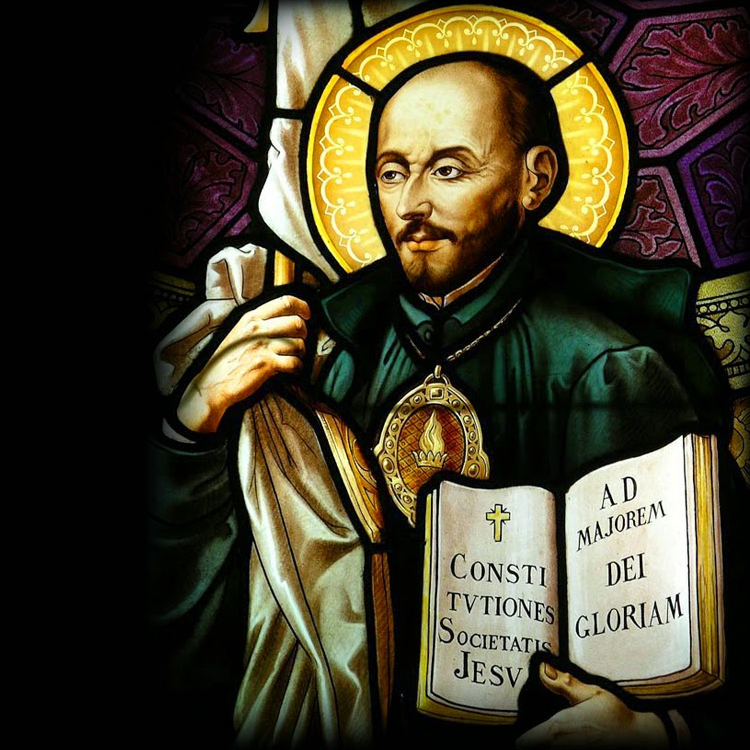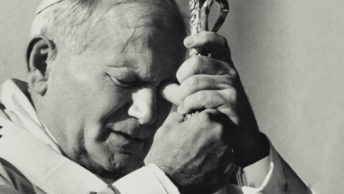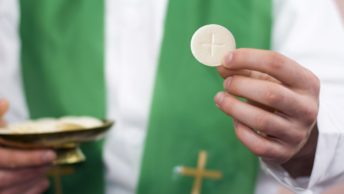The people in the Gospel of John (6:24-35) had to work hard to find Jesus. After the multiplication of the loaves and fish, last Sunday’s reading, John says that the disciples took a boat to cross the sea, probably the Sea of Galilee. Jesus was not in the boat with them. The people must have realized that. But as they looked and looked for Jesus, they could not find Him on their side of the shore. Finally, someone came up with the idea of going to where His disciples were. Perhaps they would know where He was. That meant crossing the sea themselves. This would be difficult, but they thought it would be worthwhile to learn where Jesus was. After all, this Jesus gave away free food. As you know, they were surprised to find that Jesus was with the disciples. He had walked out to his disciples’ boat, walking on the water. That’s why the people asked Jesus, “When did you get here?” Jesus didn’t answer their question. Instead, He commented on why they were looking for Him. They wanted more loaves and fish, and put themselves out to get it.
Jesus addresses the difference between the food that they sought and the food that they need. They sought a food that would eventually leave them hungry. He could provide a food that would fill them forever. He Himself is that food, the Bread of Life. He will give Himself. He is the food that hungry people really need.
What is the food that we are seeking? Certainly, all of us want to be happy. Sane people throughout the world have this as their goal. But most of our happiness is merely temporary pleasure. It is fleeting. Where can lasting happiness be found?
St. Ignatius of Loyola, the founder of the Jesuits, asked himself this question as he lay in a convent recuperating from a war injury. Ignatius was a Spanish soldier living a wild life, an immoral life. Then his leg had been crushed by a canon ball. In those day, the 16th century, people would often die from infection after a wound like this, but Ignatius survived. He was bedridden in the convent for months. When he was able to read, he wanted to read the stories of legendary heros and adventurous knights. He always loved those and used to read them avidly. But the good sisters didn’t have any of those sort of books in the convent. All they had was a life of Christ and the lives of the saints. That is all Ignatius could read. After a while he became enthralled. He wondered if he could ever be a hero in the Church like St. Francis or St. Dominic or any of the saints. But, he writes, he would often go back to thinking about the books of adventure he used to read. He liked thinking about them. For a little while, anyway. But he noticed that even the pleasure he felt when he remembered those books was fleeting. He then thought about how he felt when he reflected on the books the sisters provided. This pleasure was not fleeting. Ignatius eventually used this as the basis of his spiritual exercise on the discernment of spirits. Basically, he was seeking that which could give lasting happiness and found it in Jesus Christ.
“The problem with you folks,” Jesus says in the gospel reading, “is that you are looking for bread that will perish. Instead, I can give you bread that is for all eternity.” He is talking to us. We work so hard, we do so much for that which is transitory, passing. And we put so little effort into that which really matters, that which lasts forever.
Consider this: what is the definition of a successful life? To many, if not most people in our country, the degree of a person’s success is in direct proportion to the amount of that person’s possessions. So by the standards of the world the person who works hard all of his or her life to afford the best of everything is seen as a success. But all this passes away. The irony is that by the time a person can enjoy the results of his hard work, he most likely will be too old, or too infirm, or too dead. And someone else will enjoy the material possessions the person has killed himself or herself to acquire.
Don’t squander your time the Lord is saying. Work for bread that lasts, not bread that perishes.
What is the bread that lasts? What is that which contains within it the element of eternity? Eternity can only be found in that which contains within it the presence of Jesus Christ. Jesus is the eternal one. Actions which bear his imprint are forever. Actions which are separate from the Lord are a waste of time, a waste of energy and a waste of the potential we have for greater happiness.
Consider the relationship of love in a family. Love which is sacrificial bears the imprint of Jesus Christ who sacrificed himself on the Cross. This real, Christian love is forever. The presence of the sacrificial love of the husband and wife for each other brings a greater and greater presence of the Lord into the family. Children learn what real love is by experiencing the sacrifice of their parents and by responding with a sacrificial love of their own. When Mom and Dad pass on, their love remains in the world as their unique reflection of the Lord continues in their children. At the same time, Mom and Dad, possessing eternity in their love, live on in the love of the Lord.
Nothing matters in life, nothing, except that which flows from the Lord and that which leads to the Lord. All the rest is a squandering of our time and energy.
“If you ask, I can give you bread that lasts forever,” the Lord says. This bread is his presence. And it is ours for the asking.
We pray today that we might make the best use of the time and talent the Lord has given us so that we can live for that which provides eternal happiness: the Bread of Life.








